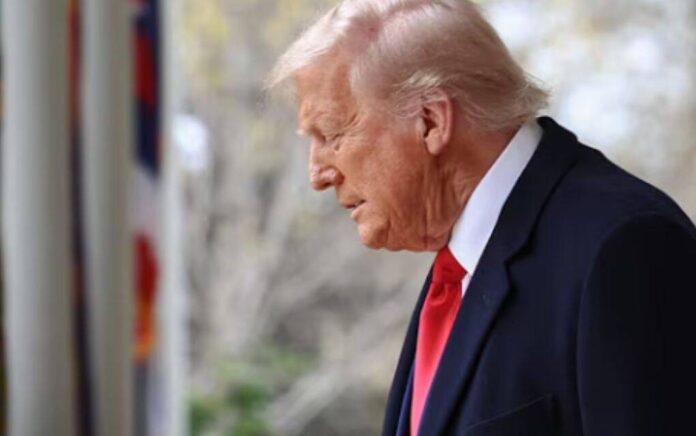
Donald Trump’s misfortunes keep piling up. He’s not happy about this latest news.
Because a federal judge just handed President Trump another devastating ruling and setback.
Trump Admin Fights Back Against Rogue Judge’s Outrageous Deportation Reversal
A federal judge has demanded that the Trump administration bring a Maryland man, Kilmar Abrego Garcia, back to the United States by midnight Monday, April 7, 2025. This order comes after the judge claimed Garcia was unlawfully deported to El Salvador, despite the administration’s firm stance that he’s a dangerous member of the notorious MS-13 gang. The Trump team is now locked in a fierce battle to protect American sovereignty and keep criminals out, even as activist judges try to tie their hands.
U.S. District Judge Paula Xinis, an Obama appointee, dropped her bombshell ruling on Friday after a dramatic hearing where the Justice Department admitted Garcia’s deportation technically violated a prior immigration court order. Xinis didn’t mince words, scolding a government lawyer with, “This was an illegal act. Congress said you can’t do it, and you did it anyway.” But the Trump administration isn’t backing down, arguing that Garcia’s removal was a necessary move to safeguard American communities from a known threat.
The judge’s order demands that the administration “facilitate and effectuate the return” of Garcia, an El Salvador native, setting the stage for a potential showdown between the White House and the judiciary. President Trump has made it crystal clear that his priority is protecting Americans, not coddling gang members. White House Press Secretary Karoline Leavitt doubled down this week, calling Garcia a part of the “brutal and vicious” MS-13 gang and vowing, “He will not be returning to our country.” That’s the kind of leadership Americans voted for—decisive action, not endless courtroom debates.
Xinis, however, waved off the administration’s concerns, claiming she hadn’t seen any hard proof of Garcia’s gang ties. “That’s just chatter, in my view. I haven’t been given any evidence,” she said during the hearing. “In a court of law, when someone is accused of membership in such a violent and predatory organization, it comes in the form of an indictment, a complaint, a criminal proceeding that has robust process so we can assess the facts.” But the Trump team knows the streets don’t wait for courtroom niceties—MS-13 doesn’t exactly hand out membership cards, and swift deportations are often the only way to stop their reign of terror.
Outside the Greenbelt, Maryland, courthouse, a noisy crowd of Garcia’s supporters cheered the judge’s ruling, turning the hearing into a circus. Inside, they clapped like it was a victory lap when Xinis read her order aloud. But the real story here isn’t their celebration—it’s the Trump administration’s relentless effort to clean up the mess left by years of lax immigration policies. Garcia’s case exploded into the national spotlight after the Justice Department conceded he was sent to El Salvador on March 15, despite a 2019 immigration judge’s finding that he faced a legitimate fear of persecution back home.
That 2019 order was still active when the administration put Garcia on a plane, part of a series of bold deportation flights targeting a Salvadoran anti-terrorism prison known for its no-nonsense conditions. Critics call it harsh; the Trump admin calls it justice. The White House argued that bringing Garcia back isn’t a simple court matter—it’s a diplomatic issue between the U.S. and El Salvador, and the judiciary has no business meddling in executive turf. This is about national security, not judicial grandstanding.
Meanwhile, another judge, James Boasberg, dragged Garcia’s case into his own courtroom this week, mulling whether to slap contempt charges on Trump officials for ignoring his March 15 order to halt those deportation flights. The administration’s push to speed up deportations using wartime powers has liberals clutching their pearls, but it’s a gutsy move to finally tackle the border crisis head-on. If the government admits it can retrieve Garcia, it could open the door for other cases—like the 130 Venezuelans shipped to El Salvador last month—proving the U.S. has the muscle to enforce its laws.
The Friday hearing turned chaotic when Justice Department lawyer Erez Reuveni threw up his hands, admitting he was as fed up as anyone with the administration’s tight-lipped stance. “I am also frustrated that I have no answer for you on a lot of these questions,” he told Xinis. “The government made a choice here to produce no evidence.” Reuveni couldn’t even cough up Garcia’s 2019 arrest warrant when the judge asked for it, saying, “I do not have that order. It is not in the record.” It’s a messy look, sure, but the Trump team’s focus isn’t on paperwork—it’s on results.
Reuveni tried to argue that Xinis has no jurisdiction, insisting this belongs in immigration court, and questioned whether the U.S. really controls inmates in that Salvadoran jail. Garcia’s lawyer fired back, pointing to Secretary of State Marco Rubio’s deal to pay El Salvador $6 million to hold prisoners for a year. Xinis bought it, saying, “You have an agreement with this facility where you’re paying the money to perform a certain service. It stands to reason that you can go to the payee and say, ‘We want the person back.’” The Trump admin, though, isn’t about to let a foreign government—or a federal judge—dictate who stays out of the U.S.
The tension peaked when Reuveni revealed he’d begged his bosses to explain why they couldn’t just grab Garcia back. “When this case landed on my desk, I asked my clients that very question. I have not received to date an answer that I find satisfactory,” he said. Right before Xinis ruled, he made a last-ditch plea for 24 hours to convince the administration to act without her interference. “I would ask the court to give us, the defendants, one more chance to do this,” he said. “That’s my recommendation to my client, but so far that hasn’t happened.” It’s a rare glimpse of the internal tug-of-war, but Trump’s resolve remains ironclad.
Garcia’s alleged MS-13 ties are the beating heart of this fight. Back in 2019, a judge found an informant’s tip credible enough to tag him as a likely gang member and a community threat, justifying his detention. He’d been in the U.S. since 2012 but didn’t cry asylum until 2019, claiming a Salvadoran gang was shaking down his mom’s pupusa business and pressuring him to join. His asylum bid got shot down as too late, but the judge blocked his deportation over persecution fears, letting him settle in Maryland with his American wife and kid.
Now, the Trump administration is drawing a line in the sand. They see Garcia as a poster child for why deportations need to happen fast and without apology—gangs like MS-13 thrive on delays and loopholes. Xinis might think she’s defending due process, but from the White House’s view, she’s just another roadblock to making America safe again. The clock’s ticking toward Monday’s deadline, and all eyes are on whether Trump will bend to this judicial power grab or stand tall for his America First agenda.
This isn’t just about one man—it’s about who gets to call the shots on immigration. The Trump administration’s fighting tooth and nail to keep control where it belongs: with the executive branch, not activist judges or bleeding-heart protesters. Garcia’s fate might hang in the balance, but the bigger stakes are clear—will the U.S. keep its backbone, or let the courts chip away at its right to protect its own? Team Trump’s betting on the former, and they’re not backing down without a fight.



















